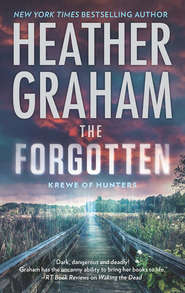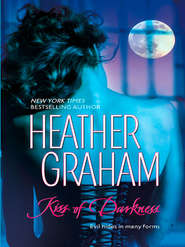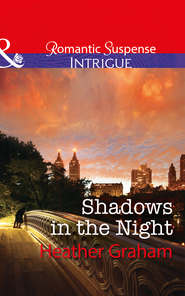По всем вопросам обращайтесь на: info@litportal.ru
(©) 2003-2024.
✖
The Night is Forever
Настройки чтения
Размер шрифта
Высота строк
Поля
“How do I like it? Just fine,” Dustin said. And it was fine. He wasn’t sure what he felt about being there today, however. There’d been a time when he’d wanted nothing more than to be assigned to one of Crow’s “special” units. Now...he wasn’t so sure.
In all honesty—and he didn’t know if it was simply self-assurance or something less commendable—he’d expected to receive a good assignment when he’d graduated from the academy. Whatever that might be. And he’d gotten a good assignment. He worked with a group of four consultants sent on diverse cases when violent crime crossed state lines.
“You enjoy working with your team?” Crow asked. Was it just a polite question?
“Yeah, I do. My coworkers are good, savvy, personable and experienced. I work with one guy, Grant Shelby, who’s six foot seven, nearly three hundred pounds of lean, mean muscle, with almost computer-powered intelligence. He’s pretty good to have around in a hostile situation. And Cindy Greenstreet had the highest test scores in the past decade. I also work with Jerry Gunter—you might have heard the name. He used to be a mixed-martial-arts champ before entering the academy. He’s pretty good to have around in a pinch, as well. If you’ve called me here, I’m sure you’ve read up on me, so you know that when I joined the bureau, I didn’t start out as a kid but came in with a lot of experience, both in combat and law enforcement.”
Crow nodded and Dustin realized that he’d known all this. Dustin’s FBI unit was smart and tough—they’d been put together to get in and get the job done.
“Good assignment,” Crow said with a nod.
“Yeah.” As he’d told them, Dustin hadn’t come into the academy as a fresh-faced twenty-something grad. Before he’d gone to college, he’d participated as a witness in a case involving a duo of oddly matched serial killers. From there, he’d gone into the military, and after the marines he’d gone into police work. He hadn’t exactly entered the department immediately; there’d been a year when he’d been in total denial about himself and his “unusual” abilities—and about the heinous things men seemed willing to do to their fellows. He’d more or less walked into the wilderness. Actually, it hadn’t been that dramatic. He’d taken a job as a forest ranger in the Everglades—except that he’d been led to bodies in giant oilcans and he’d realized it was time to move his efforts in the best possible direction. There were certain things a man couldn’t escape—and his own nature was one of them.
So he’d decided to apply to the academy.
“You know all about me,” Dustin said. “Why are we meeting?”
David looked at Jackson Crow and shrugged.
“What do you know about the Krewes?” This time, it was Malachi Gordon who spoke. Dustin knew his name; he was a recent graduate of the academy. He’d come into the bureau after working a case in Savannah.
Dustin leaned back. “I’ve read about what happened in Savannah,” he told Malachi. “You know I worked with David so, of course, the beautiful city of Savannah is near and dear to my heart. In fact, I was somewhat surprised that my unit wasn’t assigned to that case, but apparently, things were already being taken care of. And, to the best of my knowledge, that case has been cleared, the paperwork wrapped up and the feds are long gone from Savannah. Having worked there, I thought I might be of some help, but...”
He paused and grinned sheepishly at David. “It seems like you all did just fine without me.”
“I’m sure you would’ve been an asset,” Malachi murmured.
Dustin looked curiously at the other man. “Thanks, but as I said—seems like you had it covered.”
“That was then—and we did have it covered. However, although the Krewes are growing, there are never enough of us, and we’re always looking for the right people,” Crow told him. “Would you be interested in seeing how you work out with one of our units?”
Dustin smiled. That was straightforward. “I initially asked about applying to one of your units. They told me there was no application process. You formed your own units.”
“That’s true,” Crow said. “And I wish I’d known about you earlier. David was talking to Malachi about you, and then Malachi talked to me. So, yes, I looked you up and pulled strings to get all the information I could on you. Thus far, each recruit has worked out. We’re...careful in the people we approach. We have to be.”
“Because you all have special talents, I take it?” Dustin asked. “And, of course, because all the other agents like to call the units ghost hunters and rib you all about it. But really, they’re all envious of your record.”
“Detective Caswell has told us that working with you was like—”
“Like working with me,” Malachi Gordon cut in. “David and I were together in New Orleans,” he explained.
“I see,” Dustin said.
“Are you a candidate, Mr. Blake?” Crow asked him.
Dustin lowered his head, hiding a smile. He looked back at Crow. “Well, let me put it this way—if you haven’t met him yet, I’d be glad to introduce you to General Bixby. He’s sitting at the bar right now, next to the man in the jeans and Alice Cooper T-shirt.”
That brought a grin to Crow’s face. Dustin hadn’t been sure the man was really capable of a smile.
“We haven’t met formally, no, but we’ve been aware of his presence.”
“I wasn’t sure if I was being tested or not.” Dustin leaned forward, resting his elbows on the table as he looked at Jackson Crow, then Dustin and finally the third man, Malachi Gordon.
“Why now?” he asked.
It was Gordon who answered him. “You’re from Nashville,” he said.
Dustin thought quickly. He was privy to law-enforcement reports daily. He hadn’t heard anything about a kidnapping or murder in the city of Nashville.
“I am from Nashville,” he said, frowning. “But I’ve been gone for a long time.”
“You go back often enough, don’t you?”
He did, except that he hadn’t been there in a while. His academic parents were living in London. His little sister, Rayna, had grown up to be a country music singer. But she’d been on tour for the past year. He’d caught up with her—and his folks—for a few days in London earlier in the summer.
“Yes, but I haven’t been back in about a year,” he said.
“That’s not too long,” David said. “Have you ever heard of a man named Marcus Danby?” Malachi Gordon asked him.
“Marcus Danby.” Dustin repeated slowly. The name was familiar. “Of course. Yes,” he said. “He founded a therapy center. He brings in clients—patients—to work with horses. Or dogs, sometimes. He was the black sheep of a very elite family, wound up addicted to everything known to man. He did time, but he was the last living member of his family and inherited property. He also changed his ways. The Horse Farm is extremely well-respected.”
“Danby is dead,” Gordon said abruptly.
“I’m sorry to hear that. How did he die?”
“Fell into a ravine,” Gordon told him. “He was buried two days ago but the autopsy report was just released. He had drugs in his system.”
“That’s a pity. The man must’ve been clean for at least twenty years,” Dustin said. “What does this—”
“Some people close to him don’t believe what they’re hearing. We’d like you to investigate,” Jackson Crow broke in.
“You don’t believe it was a fall—or you don’t believe he was on drugs?”
“Neither,” Malachi replied.
“Are the police suspicious?” Dustin asked.
“No.” Crow shook his head.
“Then I don’t really understand—”
“Special Agent Blake, we often find ourselves slipping in when local law enforcement doesn’t see an immediate problem,” Crow said.
“I see.”
Malachi Gordon told him, “We’d like you to go in as a patient.”
“As a patient. You want me to go in as a patient and investigate an accident brought on by substance abuse when no one believes it might have been anything other than it appeared?”











